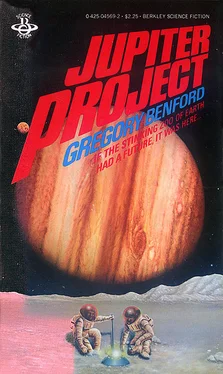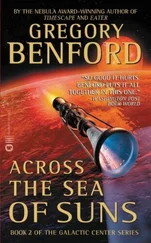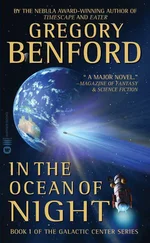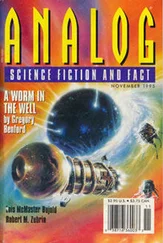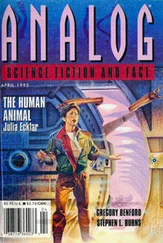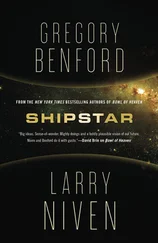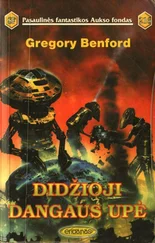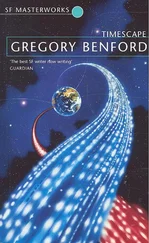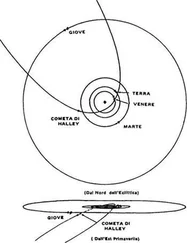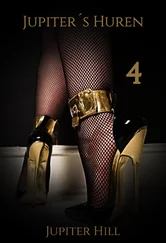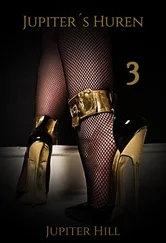I maneuvered my shot, not taking any special pains to get into the right position. I watched Yuri out of the corner of my eye. He glided across the tube, looked back at me and kicked off again. This time he followed a line that passed between me and the ball for several seconds, blocking my view of where the ball was bouncing off the tube wall.
I pretended not to notice. I pushed off to my left, opposite the way Yuri was going. The ball came flying out of the forecourt, struck the tube wall and twisted off to the side. Yuri had put spin on it—spin I would’ve detected if I had seen the ball’s first bounce.
I was moving one way and the ball, suddenly, was doing just the opposite, and closing with me all the while. I writhed around, trying to reach the tube wall and get another push, but I wasn’t close enough. I made a stab with my racket, but the ball sailed past and thonked hollowly against the blue backcourt wall.
“I believe that makes—” Yuri said.
“Nineteen,” I finished.
Okay, what he’d done wasn’t illegal. It was merely outside the Gentleman’s Convention, and without a referee I couldn’t prove it. Now I understood why I’d been missing shots by a few centimeters, having trouble anticipating his moves and losing sight of the ball. Yuri was playing to make that happen.
The next serve was Yuri’s. I proved once more that we Bohles are slow learners: Yuri used his same serve, but placed it about a foot further away than usual, so my hit-it-on-the-somersault trick didn’t work that time. Besides, I wasn’t really concentrating. I was simmering with anger, kicking myself for not noticing Yuri’s tactics before.
It was my serve. I took a deep breath; the air smelled sour, flat. I hit the ball viciously, taking out my anger on it, and it came off the forecourt badly aimed. It made a nice, clean setup for Yuri. He hit a quick one past me and I couldn’t catch the ball on the rebound. Point to him.
Yuri served, we had a respectable rally that left me winded, and he outfoxed me with a little dink shot to take the game 21 to 13. Game, set, match.
I drifted to a stop in the middle of the court. “Remarkable placement, Yuri,” I said mildly. “You must be quite a growing boy, getting bigger every day. It’s getting harder and harder to see around you.”
Yuri gave me his lummox look. “You imply something?”
“Nothing I can prove.”
“Precisely put. Everyone knows I have been practicing to beat you. It would be bad form for you to complain after losing so badly.”
“You don’t think they’d believe me?”
“Some might wonder…” He casually flicked his racket through the air in a forehand shot, watching it carefully. “But I do not think you are so unwise.” He swung again, making a thin whipping sound.
I set my jaw, gripped my own racket…and then felt sort of stupid. He was right. I couldn’t prove anything, and getting into a brawl on the court wouldn’t help.
“Forget it. You have to beat Ishi to win the tournament, and I don’t think he’ll make the mistakes I did.” (I knew he wouldn’t. I was going to warn him.)
“Very good.” Yuri paused. “I think I shall stay and practice for a bit,” he said pointedly.
“Okay, I’m leaving anyway. I’m due on watch in Monitoring.”
So I left, feeling depressed. I opened a curved panel in the court wall and wriggled into the one-man transfer pipe beyond. I coasted along it, using every other handhold, and came to another hatch. I went through it into a slightly larger tube big enough for two-way traffic, but I didn’t meet anybody in the two hundred yards to the “top” of the center axis.
The squash court, you see, is on the axis of my home. The Jovian Astronautical-Biological Orbital Laboratory, JABOL. Quite a mouthful. We don’t call it that, of course—usually it’s just the Can.
That’s pretty much what it looks like—a big tin can, spinning slowly in the utter black night of deep space. The lid of the Can is a pancake of water, held in shape by a flexible plastic sack. It’s a radiation shield, actually. It floats 50 meters above the spinning metal cylinder of the Can. The bottom lid is the same, so you can’t look into the Can from outside easily. If you could, you’d see that it isn’t solid. There’s a big hollow cylinder in the middle, open to space. That’s where we store our ships and shuttlecraft. There’s room enough, because the hollow center is 200 meters across. And smack in the middle is a long pipe, the central axis, connected by spokes to the main body of the Can. I was in that pipe.
The axis doesn’t spin with the rest of the Can; it’s suspended on gimbals. That means it doesn’t have any centrifugal “gravity”—it’s in free fall conditions. Ideal for adapting an Earthside game, like squash, to zero-g.
Don’t get the idea that JABOL set the central axis just so for the benefit of squash players—it’s all rigged for the Far Eye, our observatory. Over a hundred Can staffers wanted to play the game, and we all had to scrounge the tubing for our court and wangle permission to build it by ourselves, on our own time. It’s ours. (Legally, of course, some bureaucrat in the Association for the Advancement of Science back on Earth has supervision—but let him try and use it.)
I reached the end of the central axis. I was still fuming, not thinking about what I was doing, and I almost closed the pressure lock on my thumb. Grimacing, I slipped into one of the personnel transfer tubes. These are the spokes that connect the axis to the Can. I coasted quickly along, ruminating on the game, and feeling the increasing faint tug of centrifugal gravity as I moved outward, radially, toward the rim decks of the Can.
First deck inside the Can is the locker room, complete with ’fresher. I stripped off my shorts and T-shirt, glad there wasn’t anybody around to ask me how the game had gone. Under the ’fresher’s alternating, stinging showers of ionized water I finally perked up.
Yuri had foxed me neatly, cheating just enough to get away with it. So what? Maybe he’d have beaten me anyway. There wasn’t much I could do about it, anyway, right? In future I’d avoid Yuri and that would be the end of it.
Right? Right.
So I thought.
Ten minutes later, all brushed and scrubbed, I stepped out of a drop tube elevator unto A deck, near Monitoring. As soon as the elevator stopped I’d felt a giant’s hand on me, the full press of one g, because A deck is the furthest one out from the Can’s axis.
I turned left and walked uphill. That’s right, uphill. The decks of the Can are cylinders with a common axis, each cylinder fitted inside the next, layered like the skin of an onion. As I strolled along, hands in pockets, five meters below my feet was the outer skin of the Can—and beyond that, the high vacuum of space. I was facing along the rim of the A-deck cylinder, so the floor curved up in front of me, eventually bending out of sight. It always looks like you’re walking uphill. You’re not, of course, because gravity—the centrifugal force, I call it, though a physicist would shake his head and remind me that it’s really “centripetal,” according to connoisseurs of mechanics—is perpendicular to the floor everywhere. It never feels like you’re walking uphill, but it looks that way, both in front and behind you. On the other hand, to right and left the floor stays flat. If the view wasn’t blocked by partitions you could see all the way to the “top” and “bottom” of the Can.
The curving hallway outside Monitoring Division is a swirl of yellows and greens that spiral around the doors and splash out onto the deck. All this gives the impression of depth and variety; halls look longer and it’s easier for the human eye to locate things, from the contrast. The ship’s psychologist says it’s good for us—who wants to look at gray prefab paneling all day?—just like the Ganymede vacations.
Читать дальше
